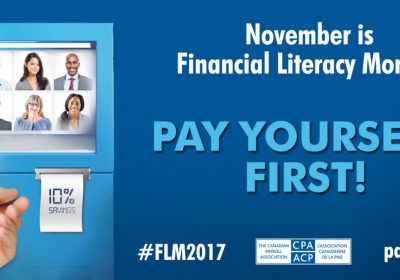- Stats: 1274 0
- Author: Linda
- Posted: November 2, 2021
- Category: Financial Literacy Month
New survey finds Canadians get passing grade on financial knowledge, but more than half underestimate how much they know
A recent Canada Life survey finds that despite having low confidence in their financial knowledge, Canadians know more than they think when it comes to their personal finance.
To kick off financial literacy month, Canada Life set out to test Canadians’ knowledge of general financial topics like saving, debt, investing and insurance. Before taking the 10-question quiz, each respondent rated their confidence in their financial knowledge. Despite only two out of five Canadians (41 per cent) claiming high confidence, the average grade on the quiz was 71 per cent.

“The survey shows a gap between confidence and actual understanding,” said Brad Fedorchuk, Executive Vice-President, Group Customer, Canada Life. “The COVID-19 pandemic has emphasized the importance of having a solid financial plan and financial literacy has become more important than ever. Financial literacy is more than knowing terminology and understanding different investment strategies – it’s about how you use your level of understanding to make choices that can put you on the right financial path.”
“What is key to understand is that knowledge on its own does not improve your financial health,” said Doretta Thompson, financial literacy leader and head of the Chartered Professional Accountants of Canada (CPA Canada) award-winning financial literacy program. “As the saying goes, knowing better doesn’t necessarily mean doing better. Knowledge is that critical first step. Then you need to build the confidence to act on that knowledge. Action is what it takes to truly improve your financial circumstance.”
Canadians aged 21 to 29 had the lowest average quiz score (56 per cent) among all age groups. However, the survey noted that younger Canadians (21 to 29 and 30 to 39) are more interested (56 per cent and 51 per cent) in learning about the topic over the next six months than any other age group.
“It’s encouraging to see that young people want to expand their financial knowledge,” said Fedorchuk. “We know the best time to start educating youth about money is at an early age – but, learning shouldn’t stop there. No matter who you are or where you live, we all need to know how to effectively manage our own money. So, whether you’re 17 and starting your first job, or 65 and looking forward to retirement, your first step towards financial success is to have a plan.”
“Today’s market can be complex and hard to navigate – Canadians don’t have to do it alone,” said Hugh Moncrieff, Executive Vice-President, Advisory Network and Industry Affairs, Canada Life. “Every Canadian has their own unique needs, and an advisor can help every step of the way. Their guidance and expertise can help ensure you’re making the right choices and building the financial confidence you need to set you on the right financial path.”
While all Canadians could benefit from expanding their financial knowledge, Fedorchuk notes that it’s never too late to educate yourself on the subject. He outlines tips that can be useful to anyone looking to learn more.
- Start your financial journey early. Retirement, education and housing are just some examples that the earlier you start saving, the more financially secure you can be when it matters most. For most, that journey starts by educating yourself on topics like where to put your money, how interest works, and which investment options can help you get to where you want to go.
- Check out Chartered Professional Accountants of Canada’s (CPA Canada) Financial Literacy Program‘s free online resources and in-person and virtual education sessions to help you brush up on your financial literacy.
- Get expert advice. Whether it’s about a group benefits and savings plan, inquiring about what type of insurance is best for you and your family or setting up your own personal financial plan, you don’t have to do it alone. If you’re not sure how to get started or require additional resources, by working with a professional, like an advisor, you have access to their financial knowledge and expertise so they can help guide you to a financial plan that works for you.
These are the findings of a study conducted by Canada Life from October 6 – 13, 2021, with an online sample of n=1,507 Canadian adults who are members of the Angus Reid Forum. The margin of error for a probability sample size of 1,507 is ± 2.5% 19 times out of 20.
SOURCE Canada Life

